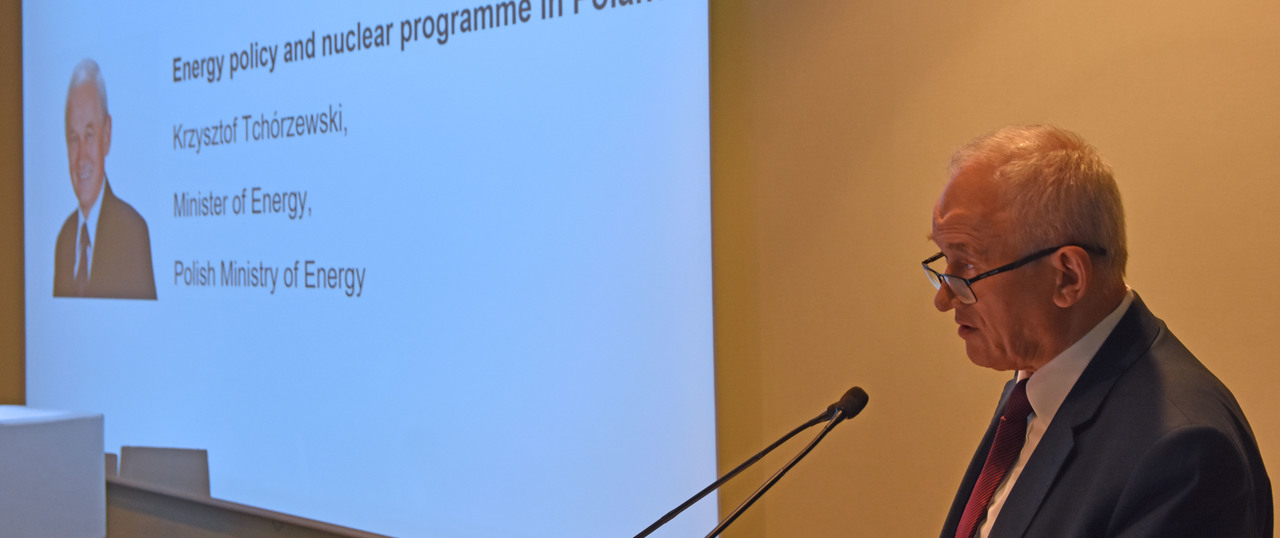Poland needs nuclear to reduce emissions and create jobs
For immediate release from World Nuclear Association
20 November 2018
Poland plans to develop nuclear energy as part of its future energy system, according to Krzysztof Tchórzewski, the Polish Minister of Energy, because it is low-cost, low-carbon and creates high-value jobs. The Minister was speaking at the inaugural World Nuclear Spotlight Poland conference in Warsaw – a high-level event which brought together Polish decision makers and global nuclear industry leaders and stakeholders.

Krzysztof Tchórzewski, Minister of Energy, Polish Minstry of Energy (Source: www.gov.pl)
Mr Tchórzewski told the conference that nuclear energy is a response to the challenges facing Polish economy and the energy sector, especially in the context of EU requirements. The climate policy of the European Union and the winter package compel a further decrease of the share of coal in the energy mix amid the continuously growing demand for electricity. The minister said that Poland must introduce a new low carbon energy source that would allow it to reduce the average CO2 emissions produced in the course of electricity generation.
As Mr Tchórzewski noted, development of nuclear energy would be an investment in Polish engineering know-how and the economy. The minister said that for the Polish industry, nuclear power provides an opportunity to implement technologically advanced projects that can contribute to the creation of stable, high-value jobs. He added that the development of the nuclear sector in Poland may also be a factor in accelerating the transfer of technologies and the development of many parent industries.
Nuclear energy also allows countries to comply with the objectives of the Paris Agreement as it contributes significantly to cutting CO2 emissions. Poland is already showing its commitment, having recently joined the Nuclear Innovation Initiative under the Clean Energy Ministerial (NICE Future), and hosting the next Conference of the Parties to the United Nations Framework Convention on Climate Change (COP 24) in December 2018 in Katowice.
A recent report published by the UN Intergovernmental Panel on Climate Change (IPCC) concludes that achieving the 1.5C goal, in line with the Paris Agreement, will require global greenhouse gas emissions to start reducing almost immediately, and nuclear generation increases on average by around 2.5 times by 2050 in the 89 mitigation scenarios considered by the IPCC.
World Nuclear Association Director General Agneta Rising told the conference that it is urgent for Poland to act now and become the next country to use nuclear generation to meet their clean energy needs sustainably. She hoped that at the upcoming COP 24 UN climate conference, which will be held in Katowice, Poland, the international community would implement energy and climate strategies that would encourage a broad range of mitigation actions, including the essential expansion of nuclear energy worldwide, so economies can develop sustainably and efficiently for the well-being of people and the planet.
Welcoming the Polish government’s strong support for nuclear energy and the country’s ambitious plans to advance its nuclear power programme, FORATOM Director General Yves Desbazeille told the conference that the construction of a nuclear power plant could help Poland meet many strategic objectives as it would provide security of energy supply, decreases dependency on fossil fuel imports, boosts the economy, and help decarbonise the power system in line with the energy and climate targets agreed at EU level.
Note to editors:
World Nuclear Spotlight Poland is organised by World Nuclear Association in collaboration with FORATOM at the invitation of the Polish Ministry of Energy taking place in Warsaw on 20 November 2018. The conference gives participants an opportunity to learn more about the current status of the Polish nuclear energy programme and understand better its potential role in Poland’s future energy mix.
For press queries, please contact:
Jonathan Cobb
press@world-nuclear.org
+44 20 7451 1536
+44 7719 329790